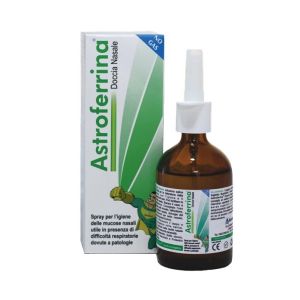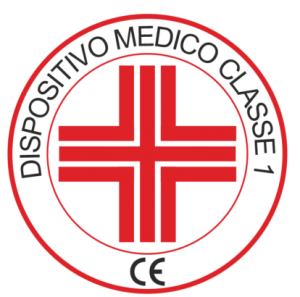Ship in Europe, Find out rates!
Language

Astroferrina Nasal Shower product Ce Cnd Q030103
BIODELTA
SKU
933869190
TAX DEDUCTIBLE
Italy
Special Price
€16.12
Regular Price
€17.00
Save... €0.88
-5%
Recent lowest price:
€16.12
In stock

Astroferrin
Nasal Shower product CE, class I. Spray for the hygiene of the nasal mucosa useful in the presence of breathing difficulties due to pathologies.
Indicated in all chronic catarrhal pathologies of the nose and related structures: rhinitis, rhinosinusitis, nasopharyngitis, in rhinosinus-bronchial syndromes. It removes dirt and bacteria from the nasal cavities, allowing to considerably reduce the risk of contagion from colds, cleans the sinusoidal cavities and is an effective treatment of sinusitis, allows you to treat the symptoms of post cold or flu because it removes mucus and phlegm from the cavities of the upper respiratory tract, it is an aid in the treatment of asthma, it is also successfully used for ear diseases, inflammation of the middle ear, ear infections, etc. It helps to improve olfactory sensitivity and for this reason to regain the sense of smell and in part to sharpen the taste and improve digestive processes.
How to use
Remove the cap and place the dispenser in the nostril. Spray 1 or 2 sprays into the nasal cavity once or more times a day as needed.
Warnings
Before using the product, ask your doctor for advice, especially after surgery on the upper airways or in cases of bleeding, especially if of unknown etiology. In cases of recognized intolerance to one or more of the ingredients listed, avoid using the product. It may be normal to feel a little stinging due to the salinity of the solution. Keep out of the reach and sight of children. After use, close the dispenser well. After use, do not dispose of the bottle and the dispenser in the environment.
storage
Store at a temperature not exceeding 25 ° C. The expiry date refers to the product in intact and correctly stored packaging.
Components
Purified water; sodium chloride; preservatives: sodium benzoate and potassium sorbate; citric acid.
Format
100 ml bottle with dispenser.
Bibliography
- Otolarryngol Pol. 2011 Jan-Feb; 65 (1): 47-53. doi: 10.1016 / S0030-6657 (11) 70627-8. Use of isotonic NaCl solution in patients with acute rhinosinusitis
Jurkiewicz D, Rapiejko P. Auris Nasus Larynx. 2013 Aug 8. pii: S0385-8146 (13) 00156-9. doi: 10.1016 / j.anl.2013.07.008. [Epub ahead of print]
Klinika Otolaryngologii, Wojskowy Instytut Medyczny W Warszawie.
- Compliance and efficacy of saline irrigation in pediatric chronic rhinosinusitis. Hong SD, Kim JH, Kim HY, Jang MS, Dhong HJ, Chuna SK. Department of Otorhinolaryngology - Head and Neck Surgery, Samsung Medical Center, Sungkyunkwan University School of Medicine, 50 Irwon-dong, Gangnam-gu, Seoul 135-710, Republic of Korea.
- J Fam Pract. 2002 Dec; 51 (12): 1049-55.
Efficacy of daily hypertonic saline nasal irrigation among patients with sinusitis: a randomized controlled trial. Rabago D, Zgierska A, Mundt M, Barrett B, Bobula J, Maberry R. Department of Family Medicine, University of Wisconsin, Madison, 53715, USA.
- Dr Blog Medicine in the clear.
Pediatr Alleray Immunol. 2012 Aug; 23 Suppl 22: 32-44. doi: 10.111l / j.1399-3038.2012.01322.x. Management of chronic rhinosinusitis.
Cazzavillan A, Castelnuovo P, Berlucchi M, Baiardini I, Franzetti A, Nicolai P, Gallo S, -Passalacqua G. Pediatric ENT Department, Buzzi Children's Hospital, Clinical Institutes of Perfection, Via Castelvetro 32, Milan, Italy.
- Cochrane Database Syst Rev. 2007 Jul 18; (3): CD006394.
Nasal saline irrigations for the symptoms of chronic rhinosinusitis.
Harvey R, Hannan SA, Badia L, Scaddina G. Royal National Throat Nose and Ear Hospital, London / John Radcliffe Hospital, Oxford, Otolaryngology, Head & Neck Surgery / Cochrane ENT Disorders Group, Level LGI West Wing, John Radcliffe Hospital, Oxford , UK, OX3 9DU.
Nasal Shower product CE, class I. Spray for the hygiene of the nasal mucosa useful in the presence of breathing difficulties due to pathologies.
Indicated in all chronic catarrhal pathologies of the nose and related structures: rhinitis, rhinosinusitis, nasopharyngitis, in rhinosinus-bronchial syndromes. It removes dirt and bacteria from the nasal cavities, allowing to considerably reduce the risk of contagion from colds, cleans the sinusoidal cavities and is an effective treatment of sinusitis, allows you to treat the symptoms of post cold or flu because it removes mucus and phlegm from the cavities of the upper respiratory tract, it is an aid in the treatment of asthma, it is also successfully used for ear diseases, inflammation of the middle ear, ear infections, etc. It helps to improve olfactory sensitivity and for this reason to regain the sense of smell and in part to sharpen the taste and improve digestive processes.
How to use
Remove the cap and place the dispenser in the nostril. Spray 1 or 2 sprays into the nasal cavity once or more times a day as needed.
Warnings
Before using the product, ask your doctor for advice, especially after surgery on the upper airways or in cases of bleeding, especially if of unknown etiology. In cases of recognized intolerance to one or more of the ingredients listed, avoid using the product. It may be normal to feel a little stinging due to the salinity of the solution. Keep out of the reach and sight of children. After use, close the dispenser well. After use, do not dispose of the bottle and the dispenser in the environment.
storage
Store at a temperature not exceeding 25 ° C. The expiry date refers to the product in intact and correctly stored packaging.
Components
Purified water; sodium chloride; preservatives: sodium benzoate and potassium sorbate; citric acid.
Format
100 ml bottle with dispenser.
Bibliography
- Otolarryngol Pol. 2011 Jan-Feb; 65 (1): 47-53. doi: 10.1016 / S0030-6657 (11) 70627-8. Use of isotonic NaCl solution in patients with acute rhinosinusitis
Jurkiewicz D, Rapiejko P. Auris Nasus Larynx. 2013 Aug 8. pii: S0385-8146 (13) 00156-9. doi: 10.1016 / j.anl.2013.07.008. [Epub ahead of print]
Klinika Otolaryngologii, Wojskowy Instytut Medyczny W Warszawie.
- Compliance and efficacy of saline irrigation in pediatric chronic rhinosinusitis. Hong SD, Kim JH, Kim HY, Jang MS, Dhong HJ, Chuna SK. Department of Otorhinolaryngology - Head and Neck Surgery, Samsung Medical Center, Sungkyunkwan University School of Medicine, 50 Irwon-dong, Gangnam-gu, Seoul 135-710, Republic of Korea.
- J Fam Pract. 2002 Dec; 51 (12): 1049-55.
Efficacy of daily hypertonic saline nasal irrigation among patients with sinusitis: a randomized controlled trial. Rabago D, Zgierska A, Mundt M, Barrett B, Bobula J, Maberry R. Department of Family Medicine, University of Wisconsin, Madison, 53715, USA.
- Dr Blog Medicine in the clear.
Pediatr Alleray Immunol. 2012 Aug; 23 Suppl 22: 32-44. doi: 10.111l / j.1399-3038.2012.01322.x. Management of chronic rhinosinusitis.
Cazzavillan A, Castelnuovo P, Berlucchi M, Baiardini I, Franzetti A, Nicolai P, Gallo S, -Passalacqua G. Pediatric ENT Department, Buzzi Children's Hospital, Clinical Institutes of Perfection, Via Castelvetro 32, Milan, Italy.
- Cochrane Database Syst Rev. 2007 Jul 18; (3): CD006394.
Nasal saline irrigations for the symptoms of chronic rhinosinusitis.
Harvey R, Hannan SA, Badia L, Scaddina G. Royal National Throat Nose and Ear Hospital, London / John Radcliffe Hospital, Oxford, Otolaryngology, Head & Neck Surgery / Cochrane ENT Disorders Group, Level LGI West Wing, John Radcliffe Hospital, Oxford , UK, OX3 9DU.
| Destination | Cost | Detail |
|---|---|---|
| Italy | €5,90* | 24/72H |
| Austria, France, Germany, Slovenia | € 13* | 3 days |
| Belgium, Luxembourg, Portugal, Netherlands, Spain | € 14* | 4 days |
| Bulgary, Cechia, Hungary, Poland, Romania, Slovakia | € 19* | 5 days |
| Denmark, Estonia, Finland, Ireland, Lithuania, Latvia ,Sweden | € 22* | 5 days |
| United Kingdom, Switzerland, Greece | € 30* | 7 days |
| Canada, USA | € 40 | 7 Days |
European shipments with express courier: FedEx, MBE, DHL
*For the shipment outside band B ther's an extra cost of 22€ *For the shipment outside band C ther's an extra cost of 30€ Delivery Times exclude Saturday and Holidays
For Islands and Areas of difficult Accessibility the shipments are made in 72 hours and the cost will be increased by 15€
The images of the products shown on our site are purely indicative and may differ in shape, color, text and packaging shown on them. Given the difficulty of updating all the products on our site in real time or any errors, XFarma.it, all products will be identified through SKU MINSAN (code of the Ministry of Health).
The transport of medicines sold online is carried out in compliance with the guidelines on good distribution practice according to Article 112-quater, paragraph 10. (Italy)